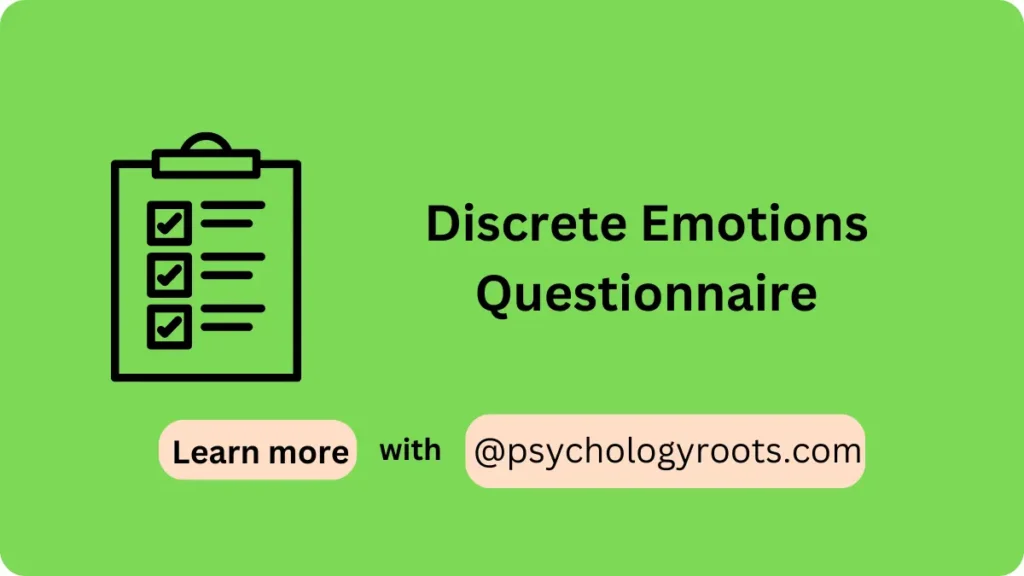Table of Contents
Discrete Emotions Questionnaire
Here in this post, we are sharing the “Discrete Emotions Questionnaire”. You can read psychometric and Author information. We have thousands of Scales and questionnaires in our collection (See Scales and Questionnaires). You can demand us any scale and questionnaires related to psychology through our community, and we will provide you with a short time. Keep visiting Psychology Roots.
About Discrete Emotions Questionnaire
Scale Name
Discrete Emotions Questionnaire
Author Details
Clayton Harmon-Jones, Brock Bastian, and Eddie Harmon-Jones
Translation Availability
Not Sure

Background/Description
The Discrete Emotions Questionnaire (DEQ), developed by Harmon-Jones, Bastian, and Harmon-Jones in 2016, is a self-report instrument designed to measure discrete emotional states. Unlike other scales that assess broad emotional dimensions (such as positive or negative affect), the DEQ focuses on specific emotions like anger, sadness, fear, and happiness. It provides a more nuanced understanding of emotional experiences by capturing distinct emotions in response to various stimuli.
The DEQ was created to fill a gap in emotion research, as most existing tools were based on dimensional models of emotion, which often overlook the importance of examining emotions as separate entities. The DEQ is widely used in psychological research, clinical settings, and experimental studies to explore emotional reactions and their impact on behavior, cognition, and physiological responses.
This tool is beneficial in various fields, including social psychology, affective science, and psychotherapy, allowing researchers and clinicians to assess how individuals experience and process different emotional states.
Administration, Scoring and Interpretation
- Target Population: The DEQ is suitable for adolescents and adults in research, clinical, and educational settings.
- Format: The DEQ consists of several items where respondents are asked to rate the intensity of specific emotional states. These emotions include:
- Positive emotions: happiness, excitement, and contentment.
- Negative emotions: anger, sadness, fear, and disgust.
- Other discrete emotions: surprise and curiosity.
- Rating Scale: Participants rate how much they feel each emotion on a Likert-type scale, typically ranging from 1 (not at all) to 7 (extremely).
- Administration Context: The DEQ is versatile and can be administered in response to specific events, stimuli, or situations to assess state emotions (current feelings). It is commonly used in experimental psychology settings where participants are exposed to emotional stimuli.
Reliability and Validity
The Discrete Emotions Questionnaire (DEQ) has demonstrated strong reliability and validity across diverse samples. Its internal consistency is robust, with Cronbach’s alpha values typically ranging from 0.80 to 0.90 for individual emotions. The scale’s validity has been supported by factor analyses, which confirm that the DEQ accurately measures discrete emotions rather than broad affective dimensions.
The DEQ also shows strong convergent validity with other emotion measures, such as the Positive and Negative Affect Schedule (PANAS), and its discriminant validity ensures that each discrete emotion is assessed independently of others.
Available Versions
Multiple-Items
Reference
Harmon-Jones, C., Bastian, B., & Harmon-Jones, E. (2016). The discrete emotions questionnaire: A new tool for measuring state self-reported emotions. PloS one, 11(8), e0159915.
Important Link
Scale File:
Frequently Asked Questions
Q: What does the Discrete Emotions Questionnaire (DEQ) measure?
A: The DEQ measures discrete emotional states, including specific positive and negative emotions like happiness, anger, sadness, and fear.
Q: Who developed the DEQ?
A: The DEQ was developed by Clayton Harmon-Jones, Brock Bastian, and Eddie Harmon-Jones in 2016.
Q: How are emotions rated in the DEQ?
A: Emotions are rated on a Likert-type scale, where participants indicate how intensely they feel each emotion from 1 (not at all) to 7 (extremely).
Q: Is the DEQ a reliable tool?
A: Yes, the DEQ has demonstrated high reliability and validity in research and clinical settings, with strong internal consistency and validated factor structures.
Q: In what contexts is the DEQ used?
A: The DEQ is commonly used in research, clinical assessments, and experimental studies to evaluate emotional reactions in response to specific stimuli or events.
Disclaimer
Please note that Psychology Roots does not have the right to grant permission for the use of any psychological scales or assessments listed on its website. To use any scale or assessment, you must obtain permission directly from the author or translator of the tool. Psychology Roots provides information about various tools and their administration procedures, but it is your responsibility to obtain proper permissions before using any scale or assessment. If you need further information about an author’s contact details, please submit a query to the Psychology Roots team.
Help Us Improve This Article
Have you discovered an inaccuracy? We put out great effort to give accurate and scientifically trustworthy information to our readers. Please notify us if you discover any typographical or grammatical errors.
Make a comment. We acknowledge and appreciate your efforts.
Share With Us
If you have any scale or any material related to psychology kindly share it with us at psychologyroots@gmail.com. We help others on behalf of you.